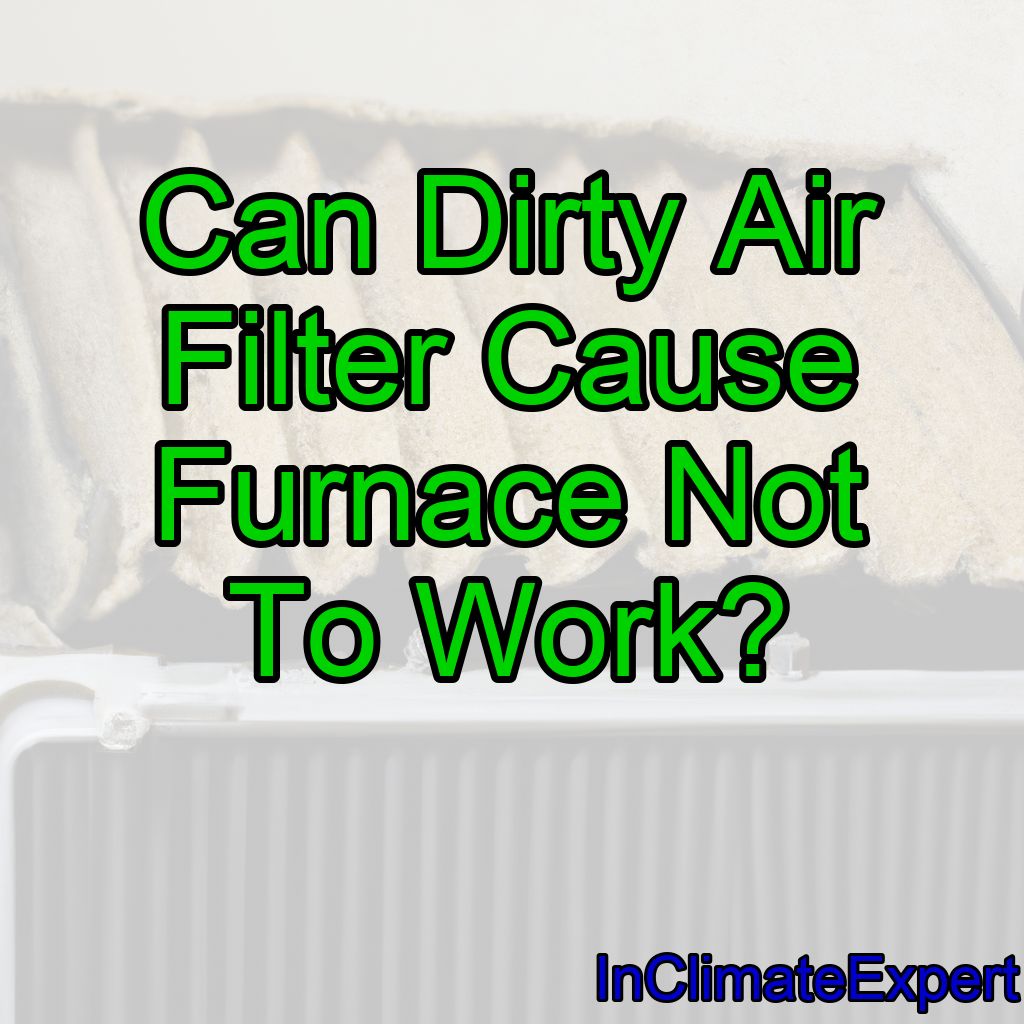Have you ever experienced a situation where your furnace stops working, and you can’t seem to figure out why? Before calling for professional help, it’s essential to check the air filter.
Yes, a dirty air filter can cause a furnace not to work properly.
A dirty air filter can cause various issues with your furnace, leading to malfunction or complete failure. When the air filter is clogged with dirt and debris, it restricts the airflow through the system. As a result, your furnace struggles to circulate warm air throughout your home efficiently. This problem not only affects the comfort levels but also puts undue stress on your furnace’s components, leading to costly repairs down the line.
In this article, we’ll explore how a dirty air filter can impact your furnace and what you can do to prevent these issues from occurring in the first place.
How An Air Filter Affects A Furnace
When it comes to maintaining your furnace, one of the most important things you can do is regularly change or clean its air filter.
The reason for this is simple: the air filter helps keep your home’s air clean by trapping dust, dirt, and other particles that would otherwise circulate through your HVAC system.
However, a dirty air filter can also cause problems beyond just poor indoor air quality. In fact, a clogged or dirty air filter can actually prevent your furnace from working altogether.
When an air filter becomes too clogged with debris, it restricts airflow into the furnace itself. As a result, the furnace has to work harder to pull in enough air to heat your home.
This extra strain on the system can cause parts to wear down more quickly and even lead to overheating or other malfunctions.
Signs Of A Clogged Filter
You might not realize it, but a clogged air filter can wreak havoc on your furnace. It’s like trying to breathe through a straw – you’re just not getting enough air.
And the same goes for your furnace. When it can’t get enough air, it starts to work harder than it should, causing unnecessary wear and tear on the system.
Not only does a dirty filter make your furnace less efficient, but it can also lead to costly repairs down the line. The excess strain on the system can cause parts to break down faster or even overheat, which could be dangerous for you and your family.
That’s why it’s important to stay aware of the signs of a clogged filter and replace it regularly to keep your furnace running smoothly. So, what are those signs?
When To Replace The Filter
You may not realize it, but the air filter in your furnace is one of the most important components of your heating system. It’s responsible for keeping your indoor air clean and healthy, but a dirty filter can cause all sorts of problems.
If you’ve been experiencing issues with your furnace, like poor airflow or strange noises, a dirty air filter may be to blame.
Here are a few signs that it’s time to replace your filter:
- Your energy bills are higher than usual
- A clogged filter makes your furnace work harder to heat your home, which can increase your energy costs.
- You notice more dust and debris around your home
- When an air filter is dirty, it can’t trap as much dirt and debris from the air. This can lead to more dust settling on surfaces throughout your home.
Replacing your furnace’s air filter is a simple task that can have a big impact on the performance of your heating system. In the next section, we’ll go over how to replace the filter so you can keep your home comfortable and healthy all winter long.
How To Replace The Filter
As we learned in the previous section, knowing when to replace your furnace filter is crucial to maintaining proper function and air quality. However, what happens if you neglect to replace it?
A dirty air filter can cause your furnace to stop working altogether. As air struggles to pass through a clogged filter, it puts unnecessary strain on your furnace’s blower motor. Eventually, this can cause the motor to overheat and shut off, leaving you without heat on a cold winter day.
In addition, a dirty filter can allow dust and debris to accumulate within your furnace system, leading to further damage and potentially costly repairs. That’s why it’s important not only to know when to replace your filter but also how to do so properly.
In the next section, we will cover step-by-step instructions for replacing your furnace filter. By following these simple steps regularly, you can ensure that your furnace operates efficiently and effectively while providing clean air for you and your family.
So let’s get started!
Conclusion
In conclusion, a dirty air filter can absolutely cause your furnace to stop working properly.
As I mentioned earlier, the primary job of an air filter is to keep dirt, dust, and other particles from getting into your HVAC system. When that filter becomes clogged with debris, however, it can no longer do its job effectively.
One of the most obvious signs of a clogged air filter is reduced airflow. You might notice that your home isn’t being heated as quickly or evenly as it used to be.
Another telltale sign is increased energy bills due to your furnace having to work harder than usual to heat your space.
If you suspect that your air filter needs replacing, don’t hesitate to take action. Not only will it help ensure that your furnace is running smoothly, but it will also improve the overall indoor air quality in your home.
So go ahead – check on that filter and give it a good cleaning or replacement if necessary. Your furnace (and lungs) will thank you!




